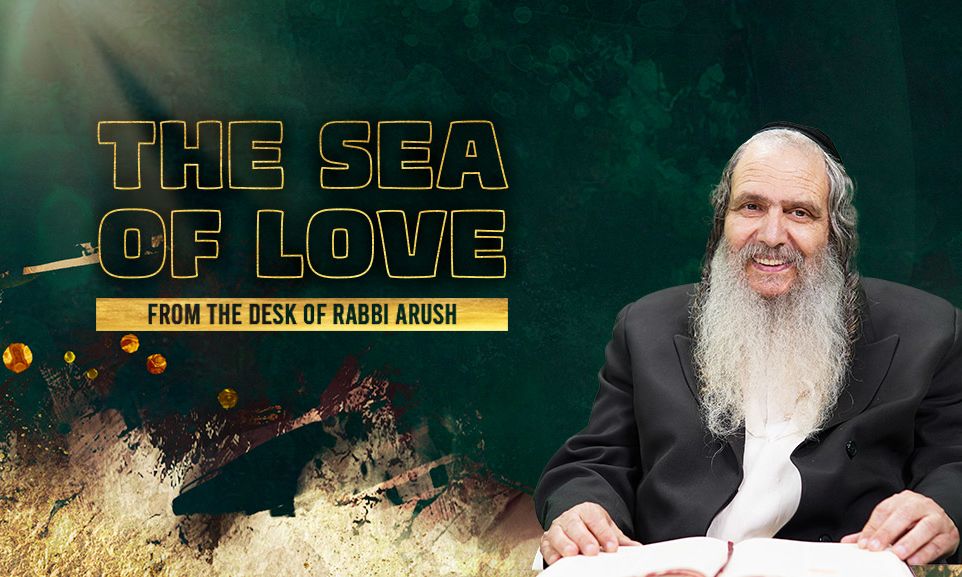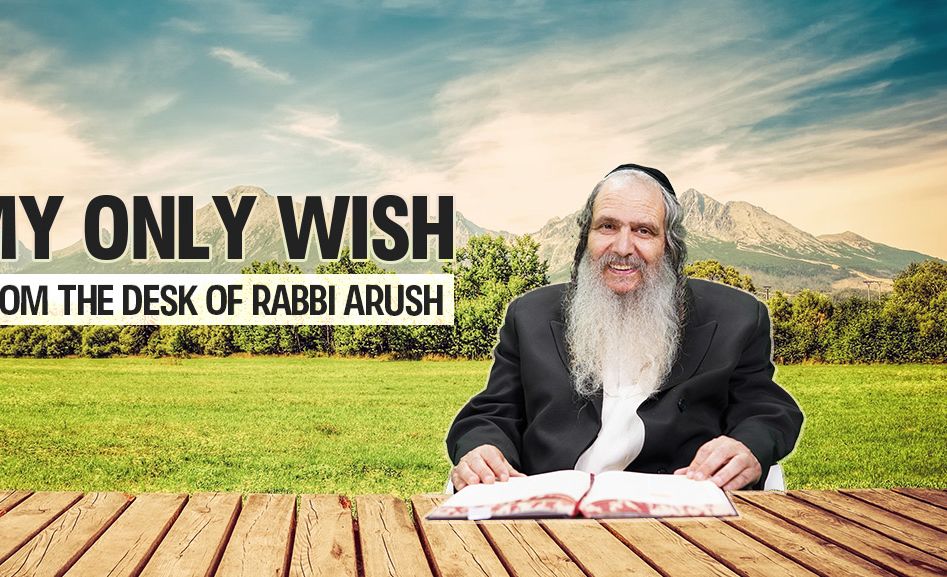
The Sea of Love
Instead of fighting endless wars and failing repeatedly, always feeling miserable and frustrated, feeling you are choking on the bad desires that are burning inside you, just focus completely on loving other Jews.

Translated from Rabbi Arush’s feature article in the weekly Chut shel Chessed newsletter.
Eating Out of Love and Eating Out of Fear
Nowadays there is a growing awareness of healthy eating. We all want to be healthy and have a healthy lifestyle. If only we could cut down on the consumption of sugar and processed foods and eat a lot of fresh fruits and vegetables!
But there is a “minor” problem. The minor problem is that healthful food is usually much less appetizing…
In order to eat all sorts of tasteless leafy greens, seaweed, or whole grains, chock-full of fiber, we require a great many convincing explanations and lectures, plus threats and warnings about the damage to our health, along with impressive promises that we will lose weight, and that this diet will clean out our blood vessels and strengthen our immune system – and after all that, if only we could indeed eat healthful foods!
Why does no one have to convince us to eat a juicy steak and chips, or have a piece of cheesecake with a cup of cappuccino? Because we love meat and fried foods, but we don’t love health-food!
And that is why we must find an alternative motivation to eat healthful food.
But take note: what one drop of love does, hours of talks and intellectual arguments have difficulty doing. Even clear threats regarding real dangers are not likely to distance a person from the unhealthy habits he is so in love with, as all those addicted to smoking and sugar can tell you.
If we want to define it in Jewish terms, we can say that we eat the unhealthful food out of love, whereas we eat the healthful food out of fear. This is a far from equal battle, and it is clear who is going to win.
The Shock Doesn’t Shock Us Anymore
So it is with observing the mitzvot. In Chazal we find so many threats and convincing arguments, scare-tactics and promises, and sharp and even shocking sayings – and even those don’t always help.
For example, Chazal say that lashon hara – speaking unfavorably about people – is equal to idol worship, immoral behavior, and murder. These are three types of transgressions, each of which shocking in itself, and Chazal put them all together so that maybe, maybe we will understand and internalize how terrible and shocking the sin of speaking lashon hara is. And yet, this saying still fails to touch us and doesn’t really convince us.
The holy Zohar warns us that when a person contaminates his mouth with forbidden speech – then his mouth becomes flawed; even the Torah that he will learn later on with this mouth, and the prayers he will offer up – all of them will be flawed, spoiled. This is a very serious threat, familiar to most of us, and still, the struggle against the desire to speak lashon hara is hard and strong and very deep.
There are many other sayings on this issue, just as appalling. These have already been collected in the book Shmirat Halashon, and still, we are not really shocked by this terrible sin, and it is still very, very hard for us to get over the habit.
Why? Because all these sayings relate only to someone who is serving Hashem out of fear. Inside, he really wants to speak lashon hara: it burns inside him, it makes him happy, it calms him, it gives him meaning, the feeling that he exists and is better than everyone else. It props up his ego, gives him life – and yet, he knows its forbidden, so he battles all those inner forces and tries to overcome his desire. Kudos to him, but it is not enough. He will need a lot of empowering and impressive quotes, threats and promises, and of course, he will have to invest a lot of energy and hours of study so that maybe, maybe he will be able to stay clear of this sin.
You can say it’s almost a lost cause, because he won’t be able to be completely free of lashon hara. For sure, he will fail here and there – at best, or give up completely – at worst.
Pleasure in the Place of Effort
But according to our introduction, there is a much stronger medicine, free of charge; one drop of it weighs and is worth more than many tons of sayings, threats, and warnings. What is it? Ahavat chinam – baseless love!
If someone would tell you bad things about your own son, you would shrink in your skin and feel no pleasure or satisfaction. It would also require no effort to disbelieve the lashon hara you just heard. Not to mention the fact, that there isn’t any chance of your going and repeating that lashon hara about your own son, right?
Why? Because you love your son, and if you love him, you have no wish or desire to speak badly of him, or think badly, or accept bad reports about him from others.
This is exactly what will happen if you merit experiencing ahavat Yisrael – love of the Jewish People. If you do experience this, you will need neither convincing nor threats. You will simply observe all the mitzvot between man and his fellow perfectly naturally and with love. You will have no struggle with the yetzer hara, and you will have no inner desire to hate, or to be jealous, to curse or to put down, to belittle or to judge unfavorably, to take revenge or bear a grudge, etc.
You will also observe the mitzvot between man and his fellow perfectly, and there is almost no chance that you will fail, because if you love someone, why should you harm him? And you will also not need to engage in endless inner battles; rather, it will be your pleasure to do so. You will enjoy every mitzvah in a true and real way.
We find, then, that the mitzvah to love other Jews is a “big rule in the Torah”, because it brings you to the observance of the entire Torah out of love and not out of fear. It upgrades all of Judaism for you. It is quite different to observe out of love as opposed to observing out of fear, and it is also much more pleasant. Observing the Torah comes more easily, and you also get more reward for it and more pleasure.
It Pays
But it is not easy to feel Ahavat Yisrael. Achieving “You shall love your fellow as yourself” means you are on a very high level. One must work and pray a lot in order to merit observing this mitzvah.
But it pays!
Instead of fighting endless wars and failing repeatedly, always feeling miserable and frustrated, feeling you are choking on the bad desires that are burning inside you, and being afraid that one day you will explode – instead of that, just focus completely on loving other Jews, and you will be clean and free of all the dark wishes. Observing the Torah will come very easily, and, besides, you will merit observing the Torah out of love!
We see from this that it is almost impossible to live as a Torah-observant Jew without ahavat Yisrael. Who can withstand such pressures and enticements? Just like it is very difficult to maintain a healthy lifestyle long-term, even if you have a doctorate in nutrition.
So, what should one do? Pray!
True, “You shall love your fellow like yourself” is a very high level, but Hashem does not challenge His creations with impossible demands. He does not expect us to complete the task all by ourselves, but we must start working on it, and make a significant step in the right direction – the same way the Sea of Reeds split in the merit of those who went into the water up to their necks, even though they had no chance of going all the way across the sea, but they did their part and Hashem helped them.
So too, we should accept upon ourselves to pray for the entire Jewish People for half an hour a day, that they should merit feeling ahavat Yisrael. This is not such a long time, compared to what we are trying to achieve, but it is the minimum necessary to merit changing and cleansing ourselves of hatred; to have Hashem have mercy on us and instill true love in our hearts for every Jew, which is the amazing way to observe the entire Torah out of love.
According to what I explained, it is also understandable why it is also a vital matter, and one can say with almost complete surety that it is impossible to be a proper Torah-observant Jew without praying for half an hour a day for the Jewish People.
Ahavat Yisrael is an ocean, but with the strength of the prayers we pray that all of the Jewish People should merit it, one can split the ocean, too. And when this ocean will split and the gates of love will open up to us, a new light will be revealed in the world and all of us will be able to witness wonders and miracles, many times those of the Splitting of the Sea.
Each and every one of us will merit feeling sublime pleasure and knowing Hashem to the point of really seeing Him, enabling us to point to Him and say, “Zeh Keli va’anvehu – This is my G-d and I will build Him a sanctuary”!












2/03/2022
Muchas Gracias por permitirme leer este artículo del Rabino Shalom Arush. Le doy Gracias a Dios por haberme permitido conocer al Rabino Arush y a Aish ha Torah, por este medio, los libros que ha escrito, sus oraciones, sus pensamientos, sus recomendaciones, todo me ha ayudado a ser una mejor persona, sentir por medio de la Emuna que estoy cerca del Creador. Me ha enseñado a orar y a pedirle al Señor por el prójimo, por mi familia, por mi vida. Muchas Gracias a Dios por todo. Quiero aprovechar para pedirle al Altísimo Señor por la salud del Rabino Shalom Arush, le pido por favor que lo sane, lo cure, le restablezca íntegramente. Un saludo muy respetuoso y con mucho cariño al pueblo de Israel. Dios bendiga y cuide siempre a Israel.
Desde la ciudad de Guayaquil, Ecuador.